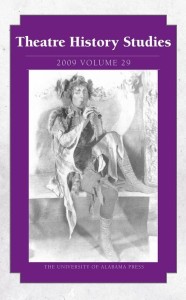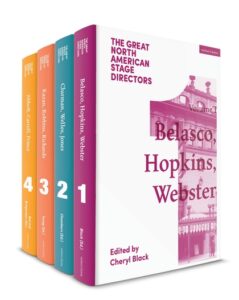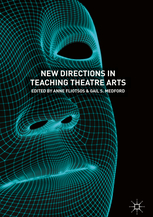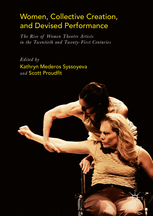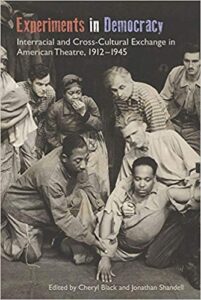Refereed Journal Articles
Osborne, Elizabeth A. “Manifestos of Care and the New Normal.” Theatre/Practice 11 (2022), online.
Following the Mid-America Theatre Conference’s 2021 Special Virtual Event, I proposed a special issue centered on the session I coordinated, “Manifestos of Care.” This essay contextualizes those five essays in their historical moment–March 2021–and reflects on the Covid-19 pandemic’s impact on theatre scholars, teachers, and artists. This essay is open-access–as is the whole journal! Please check it out!
Osborne, Elizabeth A. “The Promise of the Green New Deal: A 21st-Century Federal Theatre Project.” TDR 65, no. 4 (December 2021): 11-28. DOI: 10.1017/S1054204321000502.
US theatre suffers from insufficient funding, mass unemployment, and widespread structural inequities. The Green New Deal, with its calls to create millions of high-wage jobs and promote equity, offers a solution: establish a Green Federal Theatre. This examination of two historical Federal Theatre Project structures — the National Service Bureau and the Community Drama Program — culminates in a manifesto for a Green Federal Theatre.
Osborne, Elizabeth A. “An Object Lesson in Americanism: Performing Cultural Amnesia in Mosinee’s Communist Invasion.” Theatre Survey 60, no. 3 (September 2019), 434-460. DOI: 10.1017/S0040557419000280.
Abstract: May 1, 1950: Mosinee, Wisconsin, falls to Communism. Invading soldiers arrest the mayor, execute the police chief, and toss disorderly individuals in the stockade. Mosinee residents participate in a loyalty parade and the mayor surrenders to the communists. These events are a matter of historic record, but that “history” was created and performed to manipulate public perception. This “object lesson in Americanism” was a town-wide pageant that used performance to imagine a possible future and instruct audience members in how to prevent a communist takeover. Its lesson spread nationwide in hundreds of newspaper articles that chronicled the day’s events.
Performed on May Day, the mock invasion was one of a series of events engineered to replace an important celebration for the working class and political left. Loyalty Day parades, rituals, and ceremonies spread across the nation in a sustained practice of rewriting U.S. culture to erase the worker-centered holiday; May Day in Mosinee is one of the most visible examples of this practice of leveraging performance to rewrite cultural memory. I suggest that the United States’ relationship to history, memory, futurity, and optimism forms a national character that makes Americans particularly vulnerable to the remaking of its collective history.
Osborne, Elizabeth A., with Jonathan Chambers, Eero Laine, Kat Leider, Diana Looser, Heather S. Nathans, Danielle Rosvally, and Kristen Wright. “What Comes Next?: Graduate Education and Contingent Labor in Theatre and Performance Studies.” Theatre Topics 29, no. 2 (July 2019), 85-102. DOI: 10.1353/tt.2019.0016.
Abstract: “What comes next?” This question haunts faculty and doctoral students alike when confronting an academic job market that has contracted dramatically since 2008. For the past decade, PhD programs in theatre and performance studies have wrestled with how to prepare students to make substantive contributions to new scholarship, and to enjoy rewarding careers in a fundamentally transformed academic landscape. Past models that envisioned the graduate-student-to-tenure-track-professor arc have given way to frustratingly long periods spent in contingent labor positions, significant student debt, and shrinking scholarly output from colleagues struggling to balance multiple part-time jobs without institutional support for their research. Beginning in 2016, a group of colleagues, both senior and emerging, from numerous institutions undertook an investigation of “what comes next?” in doctoral training. This article documents our findings, drawing together the results from previous surveys of the field and adding to it with more than 40 interviews and 500 survey responses of our own.
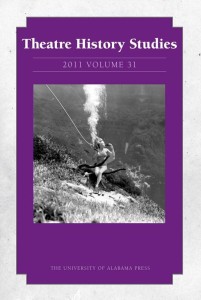
Theatre History Studies, Volume 31
Osborne, Elizabeth A. “Storytelling, Chiggers, and the Bible Belt: The Georgia Experiment as the Public Face of the Federal Theatre Project.” Theatre History Studies 31 (2011), 9-26. DOI: 10.1353/ths.2011.0016.
Abstract: This article focuses on the Federal Theatre Project’s Georgia Experiment, a little-known but often publicized activity of the FTP in the southern region which became symbolic of the FTP’s efforts to engage with working class audiences and to develop locally-relevant drama throughout the United States. (Recipient of the Robert A. Schanke Research Award.)
Osborne, Elizabeth A. “Disappearing Frontiers and the National Stage: Placing the Portland Federal Theatre Project.” Theatre History Studies 29 (2009), 103-121. DOI: 10.1353/ths.2009.0014
Abstract: This article examines the heretofore ignored activities of the Portland, Oregon, branch of the Federal Theatre Project, and argues that the Portland unit provides a valuable case study for a successful model of FTP activity.
Osborne, Elizabeth A. “A Nation in Need: Revelations and Disaster Relief in the Federal Theatre Project.” Journal of American Drama and Theatre 20, no. 2 (Spring 2008): 49-64.
Abstract: The Federal Theatre Project sent a group of traveling performers to perform for flood victims in the aftermath of the Great Flood of 1937. In this essay, I argue that this activity, previously overlooked by scholars, was fundamental to the realization of the FTP’s goals on regional and national levels. For the complete essay — and the complete volume! — see http://jadtjournal.org/past-issues/volume-20-issue-2-spring-2008/.
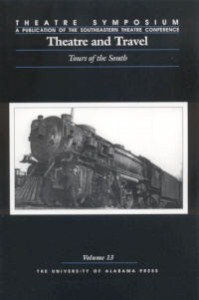
Theatre Symposium, 2005
Osborne, Elizabeth A. “Yankee Consternation in the Deep South: Worshipping at the Altars of Steel.” Theatre Symposium 13 (2005): 51-67.
Abstract: In this article, I explore how Altars of Steel—a southern social-labor drama described as the FTP’s “most important southern production”—both reflected and challenged the social, political, and economic hegemony of the South, and suggest that these challenges prevented the FTP from laying a solid foundation in the southern region.
Refereed Book Chapters
Osborne, Elizabeth A. “Beyond Writing: Susan Glaspell and the Federal Theatre Project.” Susan Glaspell and her Contexts, edited by J. Ellen Gainor. Cambridge University Press, Literature in Context (invited, in press).
Osborne, Elizabeth A. “The Promise of It Can’t Happen Here: Performances of History in Times of Crisis.” In Federal Theatre Project: Enjeux & Contexte, edited by Emeline Jouve & Géraldine Prevot. University of Sorbonne Press (in press, 28 manuscript pages).
Osborne, Elizabeth A. “Hallie Flanagan: Arena.” The Routledge Anthology of Women’s Theatre Theory and Dramatic Criticism, edited by Catherine Burroughs and J. Ellen Gainor. Routledge (in press).
Osborne, Elizabeth A. and J. Ellen Gainor. “Susan Glaspell’s Federal Theatre Project Speech.” The Routledge Anthology of Women’s Theatre Theory and Dramatic Criticism, edited by Catherine Burroughs and J. Ellen Gainor. Routledge (in press).
Osborne, Elizabeth A. “Money Matters: Dismantling the Narrative of the Rise of Regional Theatre.” The Cambridge Companion to American Theatre Since 1945, edited by Julia Listengarten and Stephen Di Benedetto. Cambridge University Press, 2021. 135-155. https://doi.org/10.1017/9781108648134.001
Osborne, Elizabeth A. “Recovering History and Supernatural Politics: Orson Welles’s Creative Collaborations in the Federal Theatre Project’s ‘Voodoo Macbeth.‘” Great North American Stage Directors, Vol. II, edited by Jonathan Chambers. Bloomsbury Methuen (invited, in press).
Abstract: The Federal Theatre Project’s “Voodoo Macbeth” is embedded deep within Welles’s mythology, and myriad colorful stories circulate around the production. Yet these anecdotes, true or not (and at least some of these are verifiably false), serve a singular function: they focus the audience’s attention away from the individual contributions of anyone other than Welles. In this chapter, I employ archival research to dismantle the myths that surround the production, particularly regarding the black cast and production team. I then shift to focus on what I call the “supernatural politics,” by which I mean both the representation of the supernatural in the text and production and the ways that Welles leveraged the “supernatural” powers of the production—literally and politically—to achieve his own ends.
Osborne, Elizabeth A. and Shelby Lunderman. “This is the Dawning of the Age of the Online Course: Reimagining Introduction to Theatre.” New Directions in Teaching Theatre Arts, edited by Anne Fliotsos and Gail S. Medford. New York: Palgrave Macmillan Press, 2018. 27-44. DOI: 10.1007/978-3-319-89767-7
Abstract: Since its 2015 pilot, Florida State University’s fully online Introduction to Theatre for Non-Majors (THE2000) has become a poster-child for FSU’s respected distance-learning programs. Our case study offers the dual perspectives of co-designers Elizabeth Osborne, professor of THE2000, and Shelby Lunderman, teaching assistant. This article explores the larger issues of cultural literacy, pedagogical framework, daily experiences, and practical issues to outline best practices for others charged with reimagining Introduction to Theatre courses in an online format
Osborne, Elizabeth A. “A Democratic Legacy: Hallie Flanagan and the Vassar Experimental Theatre.” In Women, Collective Creation, and Devised Performance, edited by Kathryn Syssoyeva and Scott Proudfit. New York: Palgrave Macmillan Press, 2016. 67-80. DOI: 10.1057/978-1-137-55013-2
Abstract: This essay examines Hallie Flanagan’s founding of and work with the Vassar Experimental Theatre between 1925 and 1942. Influenced by her Guggenheim study abroad, Flanagan’s work with the young women of Vassar College emerged in an environment characterized by the ideal of an artistic collaborative working in collaboration with society toward the common good. I argue that Flanagan’s approach to theatre as a social and creative process empowered both her students and the community, and that Vassar students spread this ideal through the nation.
Osborne, Elizabeth A. “Imagined Democracy: The Federal Theatre Project Performs (Native) America.” In Experiments in Democracy: Interracial and Cross-Cultural Exchange in American Theatre and Performance, 1912-1945, edited by Jonathan Shandell and Cheryl Black. Carbondale: Southern Illinois University Press, 2016. 172-190.
Abstract: Focusing on the “First Americans” radio plays, this essay explores the FTP’s uneasy relationship with and representations of native peoples during the 1930s, a pivotal decade for US relations with Native Americans. I argue that the conflicting representations seen in this series demonstrate the long-standing racial tensions that haunted the public imagination, and that this performance of “other” both promoted and undermined the democratic model of self-governance and multiculturalism—an historic “experiment in democracy”—forwarded by the Roosevelt administration.
Osborne, Elizabeth A. and Christine Woodworth. “The Work of Play in Performance.” In Working in the Wings: New Perspectives on Theatre History and Labor, edited by Elizabeth A. Osborne & Christine Woodworth. Carbondale: Southern Illinois University Press, 2015. 1-20.
Abstract: How do we define work in regards to theatre? How do theatrical performances offer insights into the contemporary social condition? This essay grapples with these questions and more, offering diverse perspectives on the definition of work itself as a way of introduction to the volume.
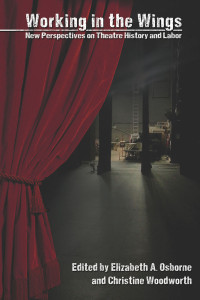
Working in the Wings: New Perspectives on Theatre History and Labor, 2015
Osborne, Elizabeth A. “Hidden in Plain Sight: Recovering the Federal Theatre Project’s Caravan Theatre.” In Working in the Wings: New Perspectives on Theatre History and Labor, edited by Elizabeth A. Osborne & Christine Woodworth. Carbondale: Southern Illinois University Press, 2015. 109-124.
Abstract: In this essay, I explore the work of the FTP’s extraordinarily popular Caravan Theatre. Playing on summer afternoons and evenings to poor and working-class audiences in New York parks, the Caravan Theatre saw weekly audiences of more than 120,000 in their first three-month season. In its second summer, the Caravan Theatre averaged 6,500 per performance and played to 1.9 million people—more than 15% of the total FTP audiences in New York City over its four-year lifetime. These popular entertainments—performances that I argue represent the real work of the FTP—offer a means to dismantle the apparatus that obscures the underlying identity of the FTP as a democratic “people’s theatre.”
Osborne, Elizabeth A. “Waiting in the Wings: Work.” In Working in the Wings: New Perspectives on Theatre History and Labor, edited by Elizabeth A. Osborne & Christine Woodworth. Carbondale: Southern Illinois University Press, 2015. 225-231.
Abstract: This concluding essay draws together the major themes of the book while posing larger historiographical questions about the nature of theatrical work and its place within theatre, scholarship, and society, and challenging theatre scholars to make interdisciplinary connections across many fields.

